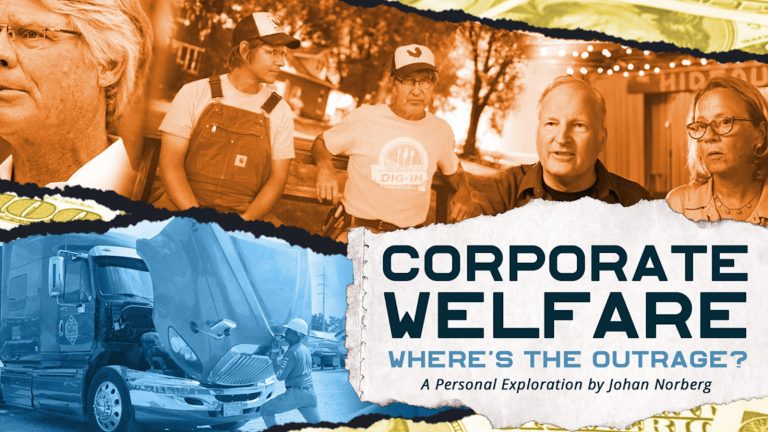“Corporate Welfare: Where’s the Outrage?” is a new documentary that discusses the effects of corporate welfare on local communities and the economy as a whole. Timely and seemingly irrefutable, it is unlikely to leave a viewer indifferent, whether they are supporters of free markets or simply question the notion of corporate welfare.
This is the latest film directed by Maureen Castle Tusty, also known for “The Singing Revolution,” which depicts the 1986-1990 nonviolent protests of Estonians against Soviet occupation, and it couldn’t be timed better. The relevancy of this particular topic is heightened by government overreach, following the onset of the COVID-19 pandemic, that was felt incredibly strongly across all industries. This overreach varied from unprecedented lowering of interest rates to injecting the economy with billions of dollars through programs like PPP (paycheck protection program), setting the grounds for a projected inflation that we have yet to see.
It is therefore exceptionally important to re-evaluate the impact of the programs that are intended to help, but are likely to end in disaster. And this film helps us understand the process.
“It always sounds good. It always seems very often to have good intentions. At least in the beginning” says director Maureen Castle Tusty, referring to the many forms of corporate welfare covered in the documentary.
The film makes it clear to the viewer that corporate welfare is not as simple as tax breaks to rich corporations, but rather the government interfering in that which is meant to be handled by markets. Through a series of short stories, weaved in together by narration from Free to Choose Media Executive Editor and Cato Senior Fellow Johan Norberg, the film unpacks the multifaceted character of government overreach when it comes to regulating businesses, agriculture, housing, and economy overall.
The stories range from local farmers in Indiana and small business owners in Chicago, IL to whole communities in Louisiana, impacted by tax breaks given to large corporations. So, as the film progresses, it shows how corporate welfare escalates to impact larger and larger communities, and, finally, the economy as a whole.
One story is painfully similar to the current situation in the housing market, with an abundance of venture capital and skyrocketing prices. It refers to the housing crisis of 2008. “That will bring us to a similar outcome. That’s in 2008. Again” says John Allision, one of the featured experts in the film, in reference to current handling of the housing market. After the onset of the pandemic, the lowering of interest rates, together with the influx of cash into the economy, inflated housing prices, at the same time encouraging people to borrow at low rates.
By looking at various types of corporate welfare and showing their negative impact, the film poses a question to viewers—how can we make America a business-friendly environment without giving unfair advantage to big corporations? An answer to that—simply stop interfering with the business—is illustrated by telling the history of deregulation in the trucking industry. It is a powerful example of how whole industries can flourish in free markets.
Thought provoking and entertaining, the documentary is a 1 hour crash course on corporate welfare, much needed in this time of government overreach.














Add comment